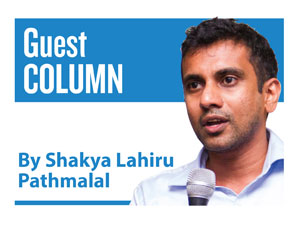Unlocking Sri Lanka’s true potential through immigration
View(s): In the 21st century the most important asset a country can have is its people or what you would term human capital. Sri Lanka, while being beautiful and a land of plenty, lacks natural resources that can be easily being sold in the world market (oil, coal, gas, etc). The cash crops that we have sold in the international market a century ago are the same product basket that we are trying to sell today. The returns on these crops are coming down at a very rapid rate. Our export’s as a percentage of GDP has been falling for the last 20 years.
In the 21st century the most important asset a country can have is its people or what you would term human capital. Sri Lanka, while being beautiful and a land of plenty, lacks natural resources that can be easily being sold in the world market (oil, coal, gas, etc). The cash crops that we have sold in the international market a century ago are the same product basket that we are trying to sell today. The returns on these crops are coming down at a very rapid rate. Our export’s as a percentage of GDP has been falling for the last 20 years.
We need to change and change fast to survive in the ever-changing economic environment and as we stand currently we don’t have what it takes.
Current context
We have huge shortfalls in skilled labour in the hospitality, garments and construction sectors. Most of the best and the brightest that Sri Lanka has educated have left due to the ethnic conflict and for economic and other factors.
The tech field in Sri Lanka is at its infancy with only a few companies being known for its product/s in the global sphere. This will include the likes of MIT, Virtusa and WSO2.
Global context
Much of the developed and the developing world have skilled migrant/worker programmes that allow companies to hire skilled labour as and when needed.
This also allows people who would want to work and live in Sri Lanka, to migrate. Skilled Sri Lankans have enjoyed from these policies for decades by moving to the West and West Asia and many have not returned. It’s crucial that we learn from best practices and implement them.
Benefits of skilled migration
1) Quick fix for labour shortages in the industries such as hospitality, garments and construction, which will allow our sluggish economy to pick up.
2) Will increase competitiveness domestically so you and I the consumer will gain from it. (Think of all the wait times for that one specialist doctor, and biting you lips and waiting hours after they said they will take you in)
3) It will lead to innovation in Sri Lanka. Industries will gain from
new ideas being bought up by individuals who have vastly different life experiences and skills sets.
4) Skilled migration will bring in money to the economy; they will
bring in personal funds for homes, consumption. They will also send out a portion of funds they earn in Sri Lanka.
5) There will be far more foreign direct investment to Sri Lanka as
investors will know that they will be able to hire the best and the brightest to work in Sri Lanka.
6) Skilled migrants will help raise the skillsets of those around them.
7) Finally we have an aging population and this will help us bring more individuals of working age
into the island.
What to watch out for
There is a narrative that is shared once we open up immigration that we will be flooded by ‘cheap’ Indian and Chinese workers. We should bring skilled migrants in and there should be a good vetting process. A skilled migrant is 10 times more valuable than an unskilled migrant.
There are also social costs associated with a high influx of unskilled migrants coming in. But what is certain is the agenda for Sri Lanka as a trade hub, which has a strong digital backbone will not happen in the vacuum. For us to reach this milestone we should have skilled labour to come into the island. They should be able to come to the country and enjoy the same privileges that are associated with being permanent residents of the island.
(The views expressed here also connect to a lively discussion on Tuesday organised by the Sunday Times Business Club on the crisis in labour. The author of this article is the co-founder/CEO of takas.lk. These are his personal opinions and do not reflect the views of his organisation. He can be reached at lahiru@takas.lk)


